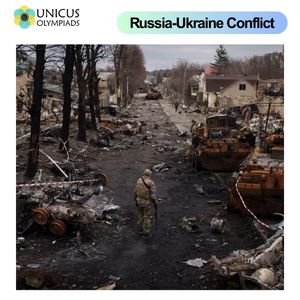

Regional conflicts have shaped global geopolitics, economies, and human lives throughout history. Among the most significant regional conflicts of the 21st century is the Russia-Ukraine conflict, which began in 2014 and escalated dramatically in 2022. Understanding such conflicts requires a detailed exploration of the causes, consequences, and broader implications. This article will focus on the Russia-Ukraine conflict, placing it in the context of regional conflicts globally. We will explore the causes, progression, and impact of the conflict, as well as its influence on international relations.
The Russia-Ukraine conflict is rooted in complex historical, cultural, political, and territorial issues. The conflict involves Russia’s annexation of Crimea in 2014, its support for separatist forces in Eastern Ukraine, and the military invasion in 2022. These events are part of a broader struggle over Ukraine's geopolitical alignment, its relationship with Russia, and its aspirations toward integration with Western institutions like NATO and the European Union.

Ukraine has historically been part of the Russian Empire and later the Soviet Union, until Ukraine gained independence after the collapse of the USSR in 1991. While Ukraine’s independence was recognized internationally, many in Russia continued to view Ukraine as part of its sphere of influence. Over the years, tensions have simmered between those in Ukraine who wish for closer ties with the West and those who see their future aligned with Russia.
The immediate spark for the conflict occurred during the 2014 Ukrainian Revolution, also known as the Euromaidan protests. These protests were driven by a desire for greater integration with Europe, particularly after then-President Viktor Yanukovych rejected an association agreement with the EU in favor of closer ties with Russia. The protests led to Yanukovych’s ouster, and the new government leaned towards pro-Western policies.
The conflict escalated dramatically in February 2022 when Russia launched a full-scale military invasion of Ukraine. The invasion marked a major escalation in the conflict, leading to widespread international condemnation and a global crisis. The motives behind the invasion are complex and include Russia's desire to prevent Ukraine from joining NATO, concerns about the influence of Western countries in the region, and efforts to reassert Russian dominance in the post-Soviet space.
The Russian invasion of Ukraine has reignited discussions about the role of NATO and the West in global security. While NATO has not directly intervened in the conflict, it has provided substantial military and economic aid to Ukraine. This support has included weapons, intelligence, and economic sanctions against Russia. Additionally, NATO members have increased their military presence in Eastern Europe to deter further Russian aggression.
Russia's invasion of Ukraine appears to be driven by a desire to prevent Ukraine from fully integrating with NATO and the European Union, which Russia views as a threat to its sphere of influence. By annexing Crimea and supporting separatists in Eastern Ukraine, Russia has sought to maintain control over its western borders and ensure that Ukraine does not align too closely with the West.
The Russia-Ukraine conflict has had far-reaching consequences, not only for the countries involved but also for global politics, economics, and security. The war has led to significant geopolitical shifts, economic disruptions, and human suffering, and it continues to shape the future of international relations.
The invasion has reshaped the global geopolitical landscape, with countries taking sides either in support of Ukraine or Russia. The conflict has also deepened the divide between Russia and the West, leading to a new Cold War-like atmosphere.
The conflict has had severe economic consequences globally, particularly in energy markets, food security, and trade. Russia’s invasion of Ukraine disrupted grain exports, particularly wheat, from Ukraine, leading to higher global food prices. Additionally, energy prices surged as European countries sought to reduce their reliance on Russian oil and gas.
The human toll of the Russia-Ukraine conflict has been devastating, with thousands of civilians killed and millions displaced. The United Nations and various humanitarian organizations have worked to provide aid to refugees and those affected by the conflict.
The Russia-Ukraine conflict has become one of the most significant geopolitical events of the 21st century, with far-reaching implications for international politics, security, and economic stability. The war has exposed vulnerabilities in global governance, energy markets, and human rights protections, while also showcasing the resilience and determination of the Ukrainian people. As the conflict continues, its long-term outcomes will influence the future of global relations, the security landscape in Europe, and the role of international institutions in resolving conflicts.